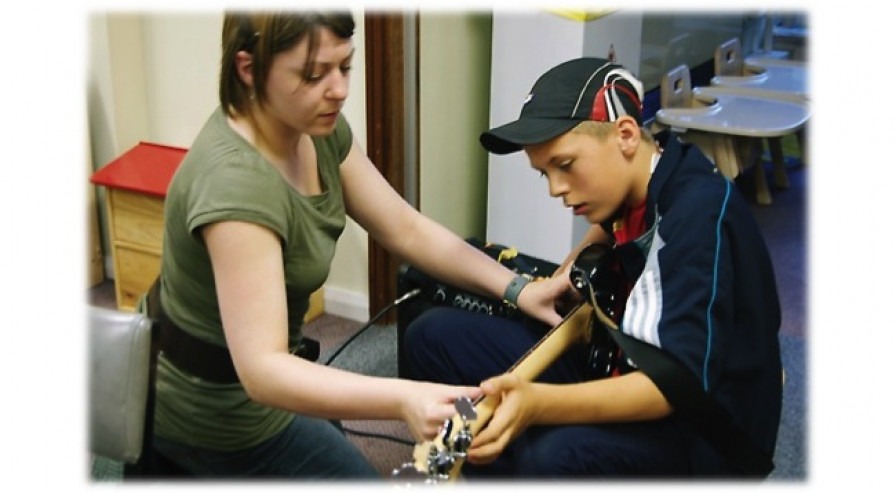'Word of mouth' and 'potential as a role model' are key, research suggests

But should we deliver karaoke as part of the national curriculum? Darren Poyzer ponders over a few short questions …
Sometimes we live and work in a bubble. We see or hear little more than what is immediate to our surroundings. We cry out for insight, something to help us over the next hurdle, to find that next job, to make something more of the one we have now, to justify the case for that next batch of funding.
Listening to children provides many clues, networking with peers likewise, but how often do we turn to research for a little insight? In my case, hardly ever, until that is I was given the opportunity to work with Arts Inform, namely Catherine Rose and Catherine Sutton, who have supported our work in the North East by delivering two quite excellent research projects.
Here are some random examples of research summaries shining a little light:
How do Employers and Commissioners find the Music Leaders they need? Many Music Leaders / Practitioners feel under-qualified to develop their career further without academic qualifications.
The Survey says: “Employers do not always find qualifications and training to be a reliable indicator of a Music Leader’s quality … word-of-mouth and recommendation, including feedback from young people is commonly used … (employers) also placed weight on the musical life and profile of the Music Leader and wanted to employ those who were active musicians. They were interested in the Music Leader’s potential as a role model.”
– from ‘Supporting the North East Music Education Workforce’ (Arts Inform for Youth Music, 2012)
~ ~ ~
How much music activity is out there? Ever heard the phrase ‘mapping’ and wondered how great it would be to know exactly where all the music learning is taking place, in and outside formal education?
The survey says: “In Milton Keynes during the 1980’s Ruth Finnegan found music in 92 schools, 8 brass bands, 100 choirs, 200 small bands - including pop, rock, folk and jazz – 4 classical orchestras and several chamber groups”
This author here summarises in a very carefree expression the way that learning makes all this possible: “A Music Leader can be anyone with an interest in music who someone is willing to follow”
– from ‘The Good-Enough Music Teacher’ (Keith Swanwick for Cambridge University Press, 2008)
A modern day study of this would be of great value to us all … add to these kind of figures the number of personal instrument teachers there are, the number of open mic opportunities, showcase events and local festivals.
Music is everywhere and so apparently are Music Leaders!
~ ~ ~
How much do Music Leaders and Employers/Commissioners value training and CPD? In my work I learn to use new apps and software, play on unfamiliar instruments, constantly adding to my musical repertoire; these are the most essential to my teaching in school. I’m considering asking my employer to provide piano lessons as part of my CPD.
The survey says: “Music Leaders and Employers/Commissioners both value training and CPD quite highly, and most Employers see it as part of their job to provide training or to provide access to training. However, Employers do not take responsibility for improving or refreshing Music Leaders’ personal musical skills.”
– from ‘Supporting the North East Music Education Workforce’ (Arts Inform for Youth Music, 2012)
~ ~ ~
Is Music Learning and Participation essential for all children? If we see music learning as being of great value to human and community spirit – and there is plenty of evidence showing that music enhances well-being, good health and a positive sense of identity - we need to start early.
The survey says: “Adults are more likely to engage in community music when they have actively engaged in musical activities during childhood”
- from ‘The Role of Music Leaders and Community Musicians’ (Andrea Creech, 2012)
~ ~ ~
And finally:
Should we deliver karaoke as part of the national curriculum? Has The X Factor and hi-tech karaoke increased participation in and quality of singing and given us a clear and obvious approach to working with hard to reach children? Does anyone know of any research having been carried out to prove, disprove or discuss this? Please text me your answer, calls cost 50p etc
· Do you have any interesting quotes from published research?
· Do you know of any research we can use to support our work?
· Have you used quotes from research to support funding bids?
· Have you used quotes from research in your publicity?
· How has research changed your personal or team’s perspective of your work?
Thanks for taking the time to read and reply, All good things as always, Darren :-)
